单元语法小专题
单元语法小专题(Grammar Focus)
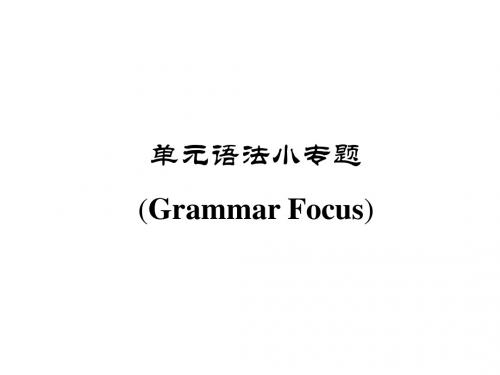
8.They go to the science club three times a week.(对画线部分提问)
How________ often do ________ they go to the science club? ________ 9.Frank usually listens to music in the evening.(对画线部分提问) What does do ________ ________ Frank usually ________ in the evening? 10.We have English lessons on Monday,Tuesday,Thursday
often,意为“多久一次”。如: —How often does Lisa go to the movies?丽萨多久看一次电影? —Never.从不。 6.频率副词或短语常与一般现在时连用。如:
I never eat meat.我从不吃肉。
Jim usually does his homework in the evening.吉姆通常晚上做作业。
Ⅱ.按要求完成下列句子,每空一词。
6.She washes clothes every Sunday.(改为否定句)
doesn't________ wash She ________ clothes every Sunday.
7.Jack usually does his homework at school.(改为一般疑问句) Does Jack ________ usually do ________ ________ his homework at school?
Sally doesn't often watch TV at the weekend.沙丽周末不常看电视。
人教版七年级英语上册Unit 2同步练习题及答案单元语法小专题(Grammar Focus)
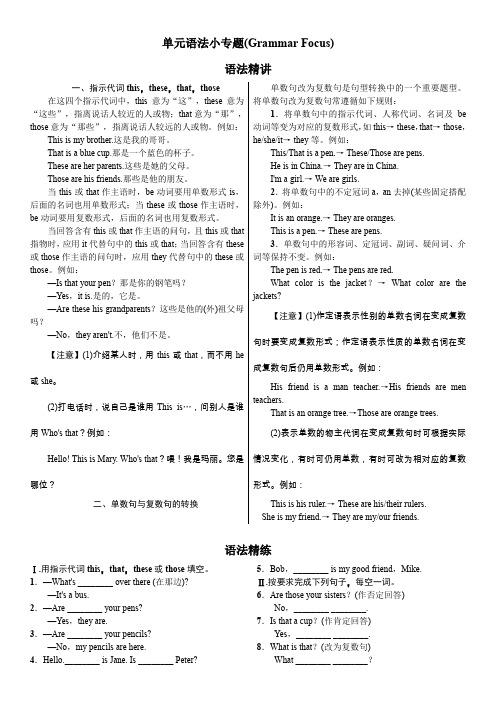
单元语法小专题(Grammar Focus)语法精讲一、指示代词this,these,that,those在这四个指示代词中,this意为“这”,these意为“这些”,指离说话人较近的人或物;that意为“那”,those意为“那些”,指离说话人较远的人或物。
例如:This is my brother.这是我的哥哥。
That is a blue cup.那是一个蓝色的杯子。
These are her parents.这些是她的父母。
Those are his friends.那些是他的朋友。
当this或that作主语时,be动词要用单数形式is,后面的名词也用单数形式;当these或those作主语时,be动词要用复数形式,后面的名词也用复数形式。
当回答含有this或that作主语的问句,且this或that 指物时,应用it代替句中的this或that;当回答含有these 或those作主语的问句时,应用they代替句中的these或those。
例如:—Is that your pen?那是你的钢笔吗?—Yes,it is.是的,它是。
—Are these his grandparents?这些是他的(外)祖父母吗?—No,they aren't.不,他们不是。
【注意】(1)介绍某人时,用this或that,而不用he 或she。
(2)打电话时,说自己是谁用This is…,问别人是谁用Who's that?例如:Hello! This is Mary. Who's that?喂!我是玛丽。
您是哪位?二、单数句与复数句的转换单数句改为复数句是句型转换中的一个重要题型。
将单数句改为复数句常遵循如下规则:1.将单数句中的指示代词、人称代词、名词及be 动词等变为对应的复数形式,如this→ these,that→ those,he/she/it→ they等。
例如:This/That is a pen.→ These/Those are pens.He is in China.→ They are in China.I'm a girl.→ We are girls.2.将单数句中的不定冠词a,an去掉(某些固定搭配除外)。
人教版七年级英语上册:Unit4 单元语法小专题【练习】

单元语法小专题(Grammar Focus~3c),01语法精讲一、方位介词的用法英语中,当要表示某人或某物在某地时,通常要借助于方位介词。
方位介词不能单独充当句子成分,必须与其他词或短语构成介词短语放在be动词或其他动词后面作表语或状语等,也可放在名词后作定语。
下面我们来看一下本单元学到的三个方位介词。
1.on意为“在……上”,表示一个物体在另一个物体的表面上。
例如:The book is on the desk.那本书在书桌上。
2.in意为“在……里”,表示一个物体在另一个物体的内部。
例如:The dictionary is in the schoolbag.字典在书包里。
3.under意为“在……下”,表示一个物体在另一个物体的正下方,但两个物体并不接触。
例如:Is the baseball under the chair?棒球在椅子下面吗?二、where引导的特殊疑问句1.用法where是疑问副词,意为“在哪里;到哪里”,用来引导特殊疑问句。
常用句型“Where is+单数名词/代词?”或“Where are+复数名词/代词?”询问人或物所在的位置。
例如:Where is my eraser?我的橡皮在哪里?Where is she?她在哪儿?Where are the keys?钥匙在哪里?Where are they?他们在哪儿?2.答语(1)用It's…(对应Where is…?)或They're…(对应Where are…?)作答。
例如:—Where is my eraser?我的橡皮在哪里?—It's in your pencil box.它在你的铅笔盒里。
—Where are the keys?钥匙在哪里?—They're under the bed.它们在床下面。
(2)直接说出物品所在地点,省略it's或they're。
例如:—Where's the clock?时钟在哪里?—On the wall.在墙上。
人教版九年级英语 习题 Unit 3 单元语法小专题
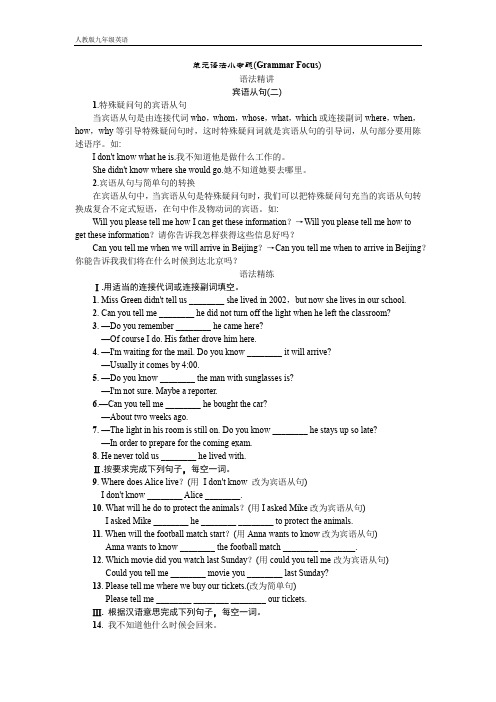
单元语法小专题(Grammar Focus)语法精讲宾语从句(二)1.特殊疑问句的宾语从句当宾语从句是由连接代词who,whom,whose,what,which或连接副词where,when,how,why等引导特殊疑问句时,这时特殊疑问词就是宾语从句的引导词,从句部分要用陈述语序。
如:I don't know what he is.我不知道他是做什么工作的。
She didn't know where she would go.她不知道她要去哪里。
2.宾语从句与简单句的转换在宾语从句中,当宾语从句是特殊疑问句时,我们可以把特殊疑问句充当的宾语从句转换成复合不定式短语,在句中作及物动词的宾语。
如:Will you please tell me how I can get these information?→Will you please tell me how toget these information?请你告诉我怎样获得这些信息好吗?Can you tell me when we will arrive in Beijing?→Can you tell me when to arrive in Beijing?你能告诉我我们将在什么时候到达北京吗?语法精练Ⅰ.用适当的连接代词或连接副词填空。
1. Miss Green didn't tell us ________ she lived in 2002,but now she lives in our school.2. Can you tell me ________ he did not turn off the light when he left the classroom?3. —Do you remember ________ he came here?—Of course I do. His father drove him here.4. —I'm waiting for the mail. Do you know ________ it will arrive?—Usually it comes by 4:00.5. —Do you know ________ the man with sunglasses is?—I'm not sure. Maybe a reporter.6.—Can you tell me ________ he bought the car?—About two weeks ago.7. —The light in his room is still on. Do you know ________ he stays up so late?—In order to prepare for the coming exam.8. He never told us ________ he lived with.Ⅱ.按要求完成下列句子,每空一词。
人教版七年级英语上册:Unit2 单元语法小专题【练习】
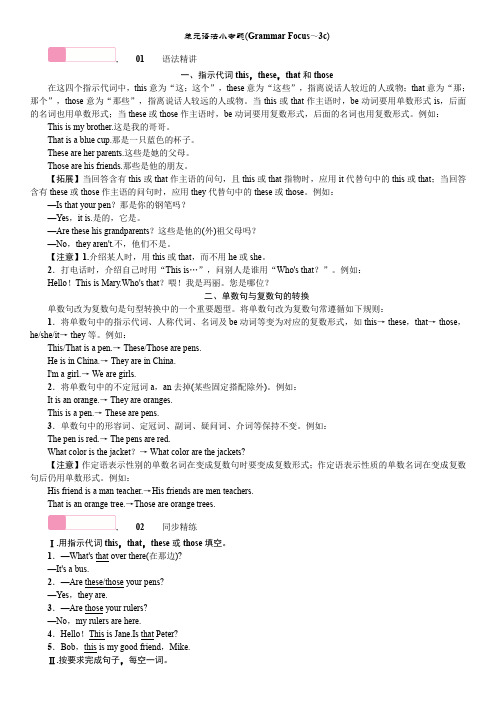
单元语法小专题(Grammar Focus~3c),01语法精讲一、指示代词this,these,that和those在这四个指示代词中,this意为“这;这个”,these意为“这些”,指离说话人较近的人或物;that意为“那;那个”,those意为“那些”,指离说话人较远的人或物。
当this或that作主语时,be动词要用单数形式is,后面的名词也用单数形式;当these或those作主语时,be动词要用复数形式,后面的名词也用复数形式。
例如:This is my brother.这是我的哥哥。
That is a blue cup.那是一只蓝色的杯子。
These are her parents.这些是她的父母。
Those are his friends.那些是他的朋友。
【拓展】当回答含有this或that作主语的问句,且this或that指物时,应用it代替句中的this或that;当回答含有these或those作主语的问句时,应用they代替句中的these或those。
例如:—Is that your pen?那是你的钢笔吗?—Yes,it is.是的,它是。
—Are these his grandparents?这些是他的(外)祖父母吗?—No,they aren't.不,他们不是。
【注意】1.介绍某人时,用this或that,而不用he或she。
2.打电话时,介绍自己时用“This is…”,问别人是谁用“Who's that?”。
例如:Hello!This is Mary.Who's that?喂!我是玛丽。
您是哪位?二、单数句与复数句的转换单数句改为复数句是句型转换中的一个重要题型。
将单数句改为复数句常遵循如下规则:1.将单数句中的指示代词、人称代词、名词及be动词等变为对应的复数形式,如this→ these,that→ those,he/she/it→ they等。
人教版(河北专版)九年级英语上册练习 Unit 1 单元语法小专题
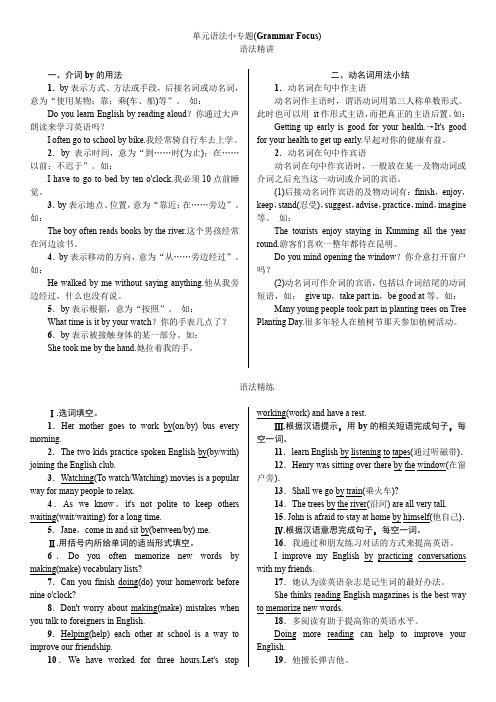
单元语法小专题(Grammar Focus)语法精讲一、介词by的用法1.by表示方式、方法或手段,后接名词或动名词,意为“使用某物;靠;乘(车、船)等”。
如:Do you learn English by reading aloud?你通过大声朗读来学习英语吗?I often go to school by bike.我经常骑自行车去上学。
2.by表示时间,意为“到……时(为止);在……以前;不迟于”。
如:I have to go to bed by ten o'clock.我必须10点前睡觉。
3.by表示地点、位置,意为“靠近;在……旁边”。
如:The boy often reads books by the river.这个男孩经常在河边读书。
4.by表示移动的方向,意为“从……旁边经过”。
如:He walked by me without saying anything.他从我旁边经过,什么也没有说。
5.by表示根据,意为“按照”。
如:What time is it by your watch?你的手表几点了?6.by表示被接触身体的某一部分。
如:She took me by the hand.她拉着我的手。
二、动名词用法小结1.动名词在句中作主语动名词作主语时,谓语动词用第三人称单数形式。
此时也可以用it作形式主语,而把真正的主语后置。
如:Getting up early is good for your health.→It's good for your health to get up early.早起对你的健康有益。
2.动名词在句中作宾语动名词在句中作宾语时,一般放在某一及物动词或介词之后充当这一动词或介词的宾语。
(1)后接动名词作宾语的及物动词有:finish,enjoy,keep,stand(忍受),suggest,advise,practice,mind,imagine 等。
2020年秋人教版八年级上册英语 unit 3单元语法小专题

单元语法小专题(Grammar Focus)语法精讲形容词、副词的比较级1.概念:英语中大多数形容词、副词有三个等级:原级、比较级和最高级。
两者比较用比较级;三者或三者以上相比用最高级。
比较的对象必须是属于同一性质或范畴的人或物。
【注意】比较的对象必须一致;比较的双方必须在同一范围内。
表示两者在某一方面相同时,用“as+形容词或副词原级+as”的句型。
如:I think science is as important as math.我认为科学和数学一样重要。
表示一方在某一方面不及另一方时,用“not as/so+形容词或副词原级+as”的句型。
如:It is not as/so warm today as yesterday.今天不如昨天暖和。
语法精练Ⅰ.用括号内所给单词的适当形式填空。
1.I think Sally did as ________(better) as Lucy in the math competition.2.Linda is much ________ (hard-working) than Anna.3.Who has ________ (many) books,Zhang Li or Li Ying?4.Do you think you are ________ (outgoing) than your father?5.It was cold yesterday,but it is much ________ (cold) today.6.This box is much ________(heavy),isn't it?7.Who is ________ (funny) than you in your class?8.I work ________(hard) this term,but David works even ________(hard).9.Which day was ________(hot),today or yesterday?10.This story is very ________(interesting),but that story is ________(interesting) than this one.Ⅱ.按要求完成下列句子,每空一词。
单元语法小专题(Grammar Focus)
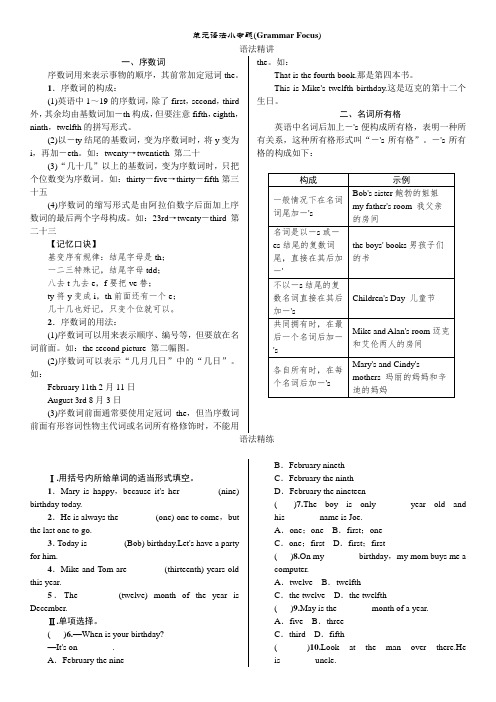
单元语法小专题(Grammar Focus)语法精讲一、序数词序数词用来表示事物的顺序,其前常加定冠词the。
1.序数词的构成:(1)英语中1~19的序数词,除了first,second,third 外,其余均由基数词加-th构成,但要注意fifth,eighth,ninth,twelfth的拼写形式。
(2)以-ty结尾的基数词,变为序数词时,将y变为i,再加-eth。
如:twenty→twentieth 第二十(3)“几十几”以上的基数词,变为序数词时,只把个位数变为序数词。
如:thirty-five→thirty-fifth第三十五(4)序数词的缩写形式是由阿拉伯数字后面加上序数词的最后两个字母构成。
如:23rd→twenty-third第二十三【记忆口诀】基变序有规律:结尾字母是th;一二三特殊记,结尾字母tdd;八去t九去e,f要把ve替;ty将y变成i,th前面还有一个e;几十几也好记,只变个位就可以。
2.序数词的用法:(1)序数词可以用来表示顺序、编号等,但要放在名词前面。
如:the second picture 第二幅图。
(2)序数词可以表示“几月几日”中的“几日”。
如:February 11th 2月11日August 3rd 8月3日(3)序数词前面通常要使用定冠词the,但当序数词前面有形容词性物主代词或名词所有格修饰时,不能用the。
如:That is the fourth book.那是第四本书。
This is Mike's twelfth birthday.这是迈克的第十二个生日。
二、名词所有格英语中名词后加上-'s便构成所有格,表明一种所有关系,这种所有格形式叫“-'s所有格”。
-'s所有格的构成如下:语法精练Ⅰ.用括号内所给单词的适当形式填空。
1.Mary is happy,because it's her ________(nine) birthday today.2.He is always the ________(one) one to come,but the last one to go.3.Today is ________(Bob) birthday.Let's have a party for him.4.Mike and Tom are ________(thirteenth) years old this year.5.The ________(twelve) month of the year is December.Ⅱ.单项选择。
人教版九年级英语 Unit 10 单元语法小专题

单元语法小专题(Grammar Focus)语法精讲suppose的用法总结suppose作为动词,其意思是“猜想,设想,认为,假设”,其常见用法为:1. be supposed to do sth.意思是“被期望做某事;应该做某事”,to是不定式符号,不是介词,后接动词原形。
be supposed to常用来表示劝告、建议、告知义务或责任等,相当于should。
如:He is supposed to arrive on time.他应该准时到达。
You are supposed to ask the teacher if you want to leave the classroom.如果你要离开教室,你应该问问老师。
You are supposed to shake hands.你应该去握手。
2. 在口语中,常用否定结构“be not supposed to do sth.”,意思是“不允许做某事;不应该做某事”,相当于shouldn't。
如:You are not supposed to smoke on the bus.(=You shouldn't smoke on the bus.)你不应该在公共汽车上吸烟。
We are not supposed to play football in the street.我们不应该在大街上踢足球。
3. be supposed to have done sth.意为“本应该做某事而没有做”。
如:You are supposed to have handed in your homework.你本应该已经交了作业。
4. supposed+that从句,当变为否定句时,否定词应该前移。
类似的词还有think,believe 等。
如:I don't suppose he will tell you about it.我认为他不会告诉你这件事。
单元语法小专题(Grammar Focus)
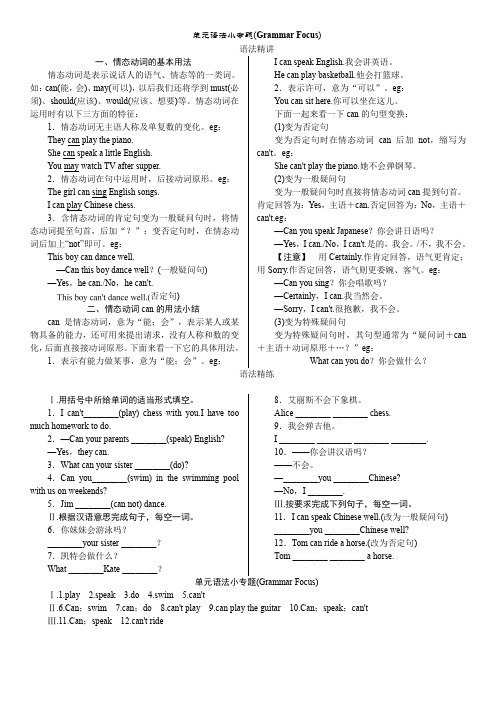
单元语法小专题(Grammar Focus)语法精讲一、情态动词的基本用法情态动词是表示说话人的语气、情态等的一类词。
如:can(能,会)、may(可以),以后我们还将学到must(必须)、should(应该)、would(应该、想要)等。
情态动词在运用时有以下三方面的特征:1.情态动词无主语人称及单复数的变化。
eg:They can play the piano.She can speak a little English.You may watch TV after supper.2.情态动词在句中运用时,后接动词原形。
eg:The girl can sing English songs.I can play Chinese chess.3.含情态动词的肯定句变为一般疑问句时,将情态动词提至句首,后加“?”;变否定句时,在情态动词后加上“not”即可。
eg:This boy can dance well.—Can this boy dance well?(一般疑问句)—Yes,he can./No,he can't.否定句)二、情态动词can的用法小结can是情态动词,意为“能;会”,表示某人或某物具备的能力,还可用来提出请求,没有人称和数的变化,后面直接接动词原形。
下面来看一下它的具体用法。
1.表示有能力做某事,意为“能;会”。
eg:I can speak English.我会讲英语。
He can play basketball.他会打篮球。
2.表示许可,意为“可以”。
eg:You can sit here.你可以坐在这儿。
下面一起来看一下can的句型变换:(1)变为否定句变为否定句时在情态动词can后加not,缩写为can't。
eg:She can't play the piano.她不会弹钢琴。
(2)变为一般疑问句变为一般疑问句时直接将情态动词can提到句首。
肯定回答为:Yes,主语+can.否定回答为:No,主语+can't.eg:—Can you speak Japanese?你会讲日语吗?—Yes,I can./No,I can't.是的,我会。
人教版七年级英语上册:Unit2《单元语法小专题》
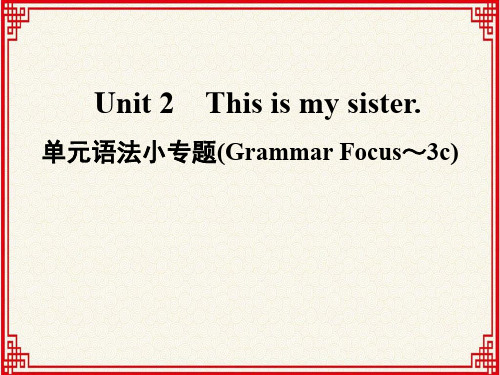
—Are those your brothers? —Yes,they are .
This is my brother.这是我的哥哥。 That is a blue cup.那是一只蓝色的杯子。 These are her parents.这些是她的父母。 Those are his friends.那些是他的朋友。
【拓展】当回答含有 this 或 that 作主语的问句,且 this 或 that 指物时,应用 it 代替句中的 this 或 that;当回答含有 these 或 those 作主语的问句时,应用 they 代替句中的 these 或 those。例如:
3.单数句中的形容词、定冠词、副词、疑问词、介词等保持 不变。例如:
The pen is red.→ The pens are red. What color is the jacket?→ What color are the jackets? 【注意】作定语表示性别的单数名词在变成复数句时要变成复 数形式;作定语表示性质的单数名词在变成复数句后仍用单数形 式。例如: His friend is a man teacher.→His friends are men teachers. That is an orange tree.→Those are orange trees.
人教版七年级英语上册:Unit1《单元语法小专题》

Unit 1 My name's Gina.
单元语法小专题(Grammar Focus~3c)
一、一般现在时中的 be 动词 1.be 动词的形式 在一般现在时的句子中,be 动词有三种形式:am,is,are。 2.be 动词的用法 (1)am 用于主语为第一人称单数代词 I 的情况。 (2)is 用于主语为第三人称单数代词、可数名词单数或不可数名 词的情况。 (3)are 用于主语为人称代词复数、第二人称代词或可数名词复 数的情况。
4.be 动词的一般现在时的各种句式 肯定句:主语+am/is/are+其他. 否定句:主语+am/is/are+not+其他. 一般疑问句:Am/Is/Are+主语+其他? 肯定回答:Yes,主语+am/is/are. 否定回答:No,主语+am/is/are+not.
【注意】第一人称在一般疑问句中通常变为第二人称,回答时, 第二人称还原为第一人称。例如:
—Are you Gina?你是吉娜吗? —Yes,I am./No,I am not.是的,我是。/不,我不是。
二、人称代词
人称代词是用来指代人或物的代词。人称代词有单数和复数两
种形式。
第一人称 第二人称 第三人称
单数
I
you
he she it复数 Nhomakorabeawe
you
they
【注意】1.人称代词有人称和数的变化。 2.人称代词有性别之分,特别是 he 指男性,she 指女性。 3.此表给出的是人称代词的主格形式,在句子中主要用作主 语。 4.通常单数人称代词的排列顺序为“第二人称,第三人称, 第一人称”;复数人称单词的排列顺序为“第一人称,第二人称, 第三人称”。
3.be 动词的缩写 I am=I'm you are=you're he is=he's she is=she's what is=what's is not=isn't it is=it's are not=aren't they are=they're 【注意】be 动词在以下几种情况下不能缩写 (1)在简略的肯定回答中,如“Yes,I am.”或“Yes,he/she/it is.”。 (2)this 和 is 不缩写。 (3)am 和 not 不缩写。
七年级英语人教版上册《Unit 3 Is this your pencil》习题 单元语法小专题(Grammar Focus)【含答案】
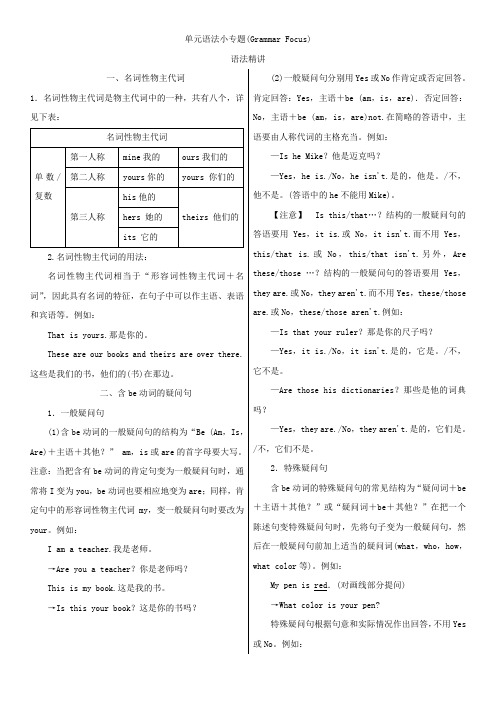
单元语法小专题(Grammar Focus)语法精讲一、名词性物主代词1.名词性物主代词是物主代词中的一种,共有八个,详见下表:2.名词性物主代词的用法:名词性物主代词相当于“形容词性物主代词+名词”,因此具有名词的特征,在句子中可以作主语、表语和宾语等。
例如:That is yours.那是你的。
These are our books and theirs are over there.这些是我们的书,他们的(书)在那边。
二、含be动词的疑问句1.一般疑问句(1)含be动词的一般疑问句的结构为“Be (Am,Is,Are)+主语+其他?” am,is或are的首字母要大写。
注意:当把含有be动词的肯定句变为一般疑问句时,通常将I变为you,be动词也要相应地变为are;同样,肯定句中的形容词性物主代词my,变一般疑问句时要改为your。
例如:I am a teacher.我是老师。
→Are you a teacher?你是老师吗?This is my book.这是我的书。
→Is this your book?这是你的书吗?(2)一般疑问句分别用Yes或No作肯定或否定回答。
肯定回答:Yes,主语+be (am,is,are).否定回答:No,主语+be (am,is,are)not.在简略的答语中,主语要由人称代词的主格充当。
例如:—Is he Mike?他是迈克吗?—Yes,he is./No,he isn't.是的,他是。
/不,他不是。
(答语中的he不能用Mike)。
【注意】Is this/that…?结构的一般疑问句的答语要用Yes,it is.或No,it isn't.而不用Yes,this/that is.或No,this/that isn't.另外,Are these/those …?结构的一般疑问句的答语要用Yes,they are.或No,they aren't.而不用Yes,these/those are.或No,these/those aren't.例如:—Is that your ruler?那是你的尺子吗?—Yes,it is./No,it isn't.是的,它是。
八年级英语人教版上册练习:Unit 5 单元语法小专题
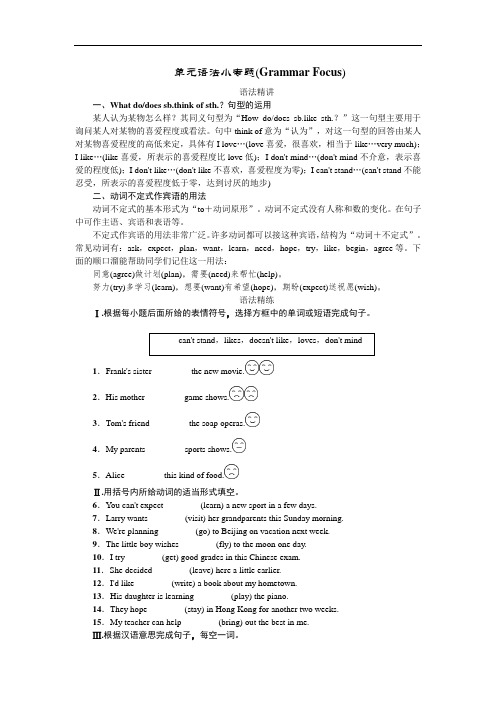
单元语法小专题(Grammar Focus)语法精讲一、What do/does sb.think of sth.?句型的运用某人认为某物怎么样?其同义句型为“How do/does sb.like sth.?”这一句型主要用于询问某人对某物的喜爱程度或看法。
句中think of意为“认为”,对这一句型的回答由某人对某物喜爱程度的高低来定,具体有I love…(love喜爱,很喜欢,相当于like…very much);I like…(like喜爱,所表示的喜爱程度比love低);I don't mind…(don't mind不介意,表示喜爱的程度低);I don't like…(don't like不喜欢,喜爱程度为零);I can't stand…(can't stand不能忍受,所表示的喜爱程度低于零,达到讨厌的地步)二、动词不定式作宾语的用法动词不定式的基本形式为“to+动词原形”。
动词不定式没有人称和数的变化。
在句子中可作主语、宾语和表语等。
不定式作宾语的用法非常广泛。
许多动词都可以接这种宾语,结构为“动词+不定式”。
常见动词有:ask,expect,plan,want,learn,need,hope,try,like,begin,agree等。
下面的顺口溜能帮助同学们记住这一用法:同意(agree)做计划(plan),需要(need)来帮忙(help)。
努力(try)多学习(learn),想要(want)有希望(hope),期盼(expect)送祝愿(wish)。
语法精练Ⅰ.根据每小题后面所给的表情符号,选择方框中的单词或短语完成句子。
can't stand,likes,doesn't like,loves,don't mind1.Frank's sister ________ the new movie.2.His mother ________ game shows.3.Tom's friend ________ the soap operas.4.My parents ________ sports shows.5.Alice ________ this kind of food.Ⅱ.用括号内所给动词的适当形式填空。
人教版九年级英语 习题 Unit 4 单元语法小专题
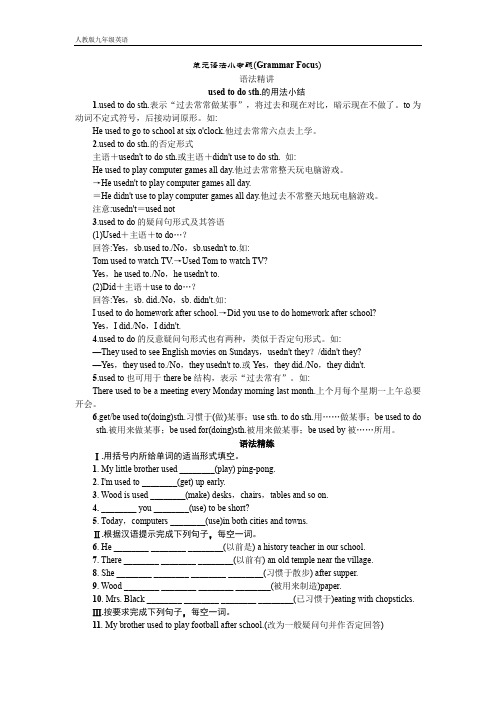
单元语法小专题(Grammar Focus)语法精讲used to do sth.的用法小结ed to do sth.表示“过去常常做某事”,将过去和现在对比,暗示现在不做了。
to为动词不定式符号,后接动词原形。
如:He used to go to school at six o'clock.他过去常常六点去上学。
ed to do sth.的否定形式主语+usedn't to do sth.或主语+didn't use to do sth. 如:He used to play computer games all day.他过去常常整天玩电脑游戏。
→He usedn't to play computer games all day.=He didn't use to play computer games all day.他过去不常整天地玩电脑游戏。
注意:usedn't=used noted to do的疑问句形式及其答语(1)Used+主语+to do…?回答:Yes,ed to./No,edn't to.如:Tom used to watch TV.→Used Tom to watch TV?Yes,he used to./No,he usedn't to.(2)Did+主语+use to do…?回答:Yes,sb. did./No,sb. didn't.如:I used to do homework after school.→Did you use to do homework after school?Yes,I did./No,I didn't.ed to do的反意疑问句形式也有两种,类似于否定句形式。
如:—They used to see English movies on Sundays,usedn't they?/didn't they?—Yes,they used to./No,they usedn't to.或Yes,they did./No,they didn't.ed to也可用于there be结构,表示“过去常有”。
八年级英语人教版上册练习:Unit 4 单元语法小专题

单元语法小专题(Grammar Focus)语法精讲形容词、副词的最高级1.定义:形容词、副词的最高级用于三者或三者以上的人或物的比较,意为“最……”。
2.形容词、副词最高级的标志词:(1)形容词最高级前通常要加定冠词the;副词最高级前面的the可以省略。
如:Kate is the most hard-working student in our school.凯特是我们学校最勤奋的学生。
【注意】形容词最高级前面若有物主代词、指示代词或名词所有格等修饰时,不用定冠词the。
如:Bob is Mr.Green's youngest son.鲍勃是格林先生最小的儿子。
形容词最高级前若有序数词限定时,the应放在序数词之前。
如:She is the third shortest students in Class Two.她是二班个子第三矮的学生。
(2)形容词、副词最高级常与介词in或of引导的短语连用,与in连用意为“在……内”,表示“在某范围内”,不一定是同类;与of连用表示“属性”,介词后的名词或代词与句中的主语是同一类人或物,意为“在某同类中”。
如:He is the oldest dentist in the hospital.他是这所医院中年龄最大的牙医。
He is the oldest of all the dentists.他是所有牙医中年龄最大的。
3.含形容词、副词最高级的句式:形容词、副词最高级的基本结构:主语+谓语+the+形容词或副词最高级+比较范围。
形容词和副词最高级常出现在以下句型中:(1)Who/Which…,A,B or C?在选择疑问句中,如果有三者或三者以上供选择,且有or连接时,要用形容词或副词最高级。
如:Which is the biggest,the earth,the sun or the moon?地球、太阳和月亮,哪个最大?(2)one of the+形容词/副词最高级+复数名词,表示在众多当中“最……之一的……”。
人教版九年级英语 Unit 7 单元语法小专题
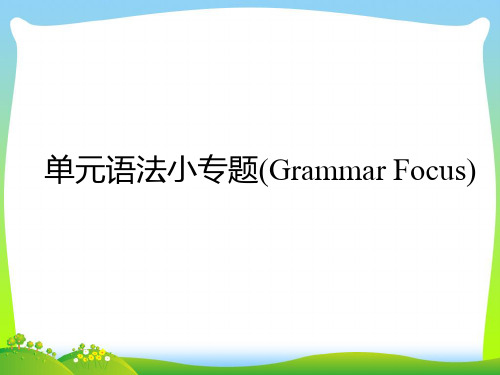
如: —Should these young trees be watered every day?应该每天给 这些小树浇水吗? —Yes,they should./ No,they shouldn‘t.对,应该。/不,不 应该。 (4)特殊疑问句结构为:疑问词+一般疑问句?如: What should students be allowed to do?应该允许学生们做什 么?
Ⅲ.根据汉语意思完成句子,每空一词。
16.更远的恒星有一天可能被参观。 Farther planets _m__a_y____ __b_e_____ __v_i_si_te_d__ one day.
17.你不应该在动物园里喂动物。 Animals __sh_o_u_l_d_n_'t____b_e___ __fe_d_____ by you in the zoo.
13、He who seize the right moment, is the right man.谁把握机遇,谁就心想事成。2021/7/212021/7/212021/7/212021/7/217/21/2021
• 14、谁要是自己还没有发展培养和教育好,他就不能发展培养和教育别人。2021年7月21日星期三2021/7/212021/7/212021/7/21
•
9、要学生做的事,教职员躬亲共做; 要学生 学的知 识,教 职员躬 亲共学 ;要学 生守的 规则, 教职员 躬亲共 守。2021/7/212021/7/21Wednesday, July 21, 2021
• 10、阅读一切好书如同和过去最杰出的人谈话。2021/7/212021/7/212021/7/217/21/2021 12:09:45 AM
(2)否定句结构为:主语+情态动词+not+be+及物动词的过 去分词+(by+宾语)Байду номын сангаас如:
- 1、下载文档前请自行甄别文档内容的完整性,平台不提供额外的编辑、内容补充、找答案等附加服务。
- 2、"仅部分预览"的文档,不可在线预览部分如存在完整性等问题,可反馈申请退款(可完整预览的文档不适用该条件!)。
- 3、如文档侵犯您的权益,请联系客服反馈,我们会尽快为您处理(人工客服工作时间:9:00-18:30)。
4.与其他句式之间的句型转换 (1)借助“祈使句+and (or)+一般将来时的句子”这一 句型来转换。and在句意上表示顺承关系,or表示转 折关系。如: If you get up early,you’ll get there on time. = Get up early,and you’ll get there on time. =Get up early,or you won’t get there on time.早点 起床,你就会准时到那里。 (2)借助介词without或with来转换条件状语从句。如: If there is no water, fish will die.=Fish will die without water.如果没有水,鱼就会死。 If you help me, I’ll finish the work soon.= With your help, I’ll finish the work soon.如果你帮助我, 我就会快点完成工作。
单元语法小专题
(Grammar Focus)
语法精讲
if引导的条件状语从句的用法 条件状语从句通常由连词if引导,意为“如果、假 如”,表示在某种条件下,很可能会发生某种事情。 1.if条件状语从句的位置 在 if 引导的条件状语从句中,if 条件句位置灵活, 可直接放在主句后面,若 if 条件句放句首, 从句后 面要加逗号,和主句隔开。如: If I have time tomorrow, I’ll go to the countryside with my friends.= I’ll go to the countryside with my friends if I have time.如果 我明天有时间,我将和我的朋友们去乡下。
( D )7.Mary will go to Sanya if she _______ a fiveday trip. A.have B.had C.will have D.has
( A )8.What will you do if you to the party without invitation? A.go B.went C.going D.will go ( D )9.If I eat too much food, I ______ too fat. A.am B.was C.will D.will be ( B )10.I’ll give the book to him if he ______ here next Sunday. A.will come es C.is coming D.came
2.if条件状语从句的时态搭配 if 引导条件状语从句,主句用一般将来时,从句则 用一般现在时。如: If it rains tomorrow, I won’t climb the hills.如果 明天下雨,我就不爬山。 温馨提示:在if 引导的条件状语从句中,有时根据 句意的需要主句可能用到情态动词。如: If you finish your homework, you can watch TV. 如果你完成了家庭作业,你可以看电视。
5.You may go swimming if you______ finish (finish) your homework.
Ⅱ.单项选择。 ( A )6.—Do you know when he will come back tomorrow? —Sorry,I don’t know.When he ________ back,I’ll tell you. es B.will come e D.may come
Ⅲ.改为同义句,每空一词。 11.Study hard, or you won’t pass the exam. pass the exam. will ______ If you study hard, you _____ 12.Take a taxi,and you’ll catch the train. If take a taxi, you’ll catch the train. ______ you ______ 13.If you don’t help me, I can’t catch up with the others. without I can’t catch up with the others__________ your _______ help . _______
语法精练
Ⅰ.用括号内所给单词的适当形式填空。 will buy (buy) you a computer if you get good 1.I_______ grades. won’t go (not go) there if he doesn’t agree. 2.We__________ practice 3.You will win the match if you ________(practice) hard. have (have) any 4.Please call me if you______ questions.
3.if引导的条件状语从句与if引导的宾语从句的区别 if 引导的条件状语从句,if意为“如果”,主句用 一般将来时,从句则用一般现在时;if引导宾语从 句时,if意为“是否”, 相当于 whether,时态需 根据语境确定。如: I don’t know if it will rain tomorrow.我不知道明 天是否会下雨。 if条件状语从句用法歌诀: if 条件句不一般,几个要点记心间; 条件句,放在前,逗号要放句中间。 条件句,表可能,主句多用将来时; 条件句,表事实,主句常用现在时。
